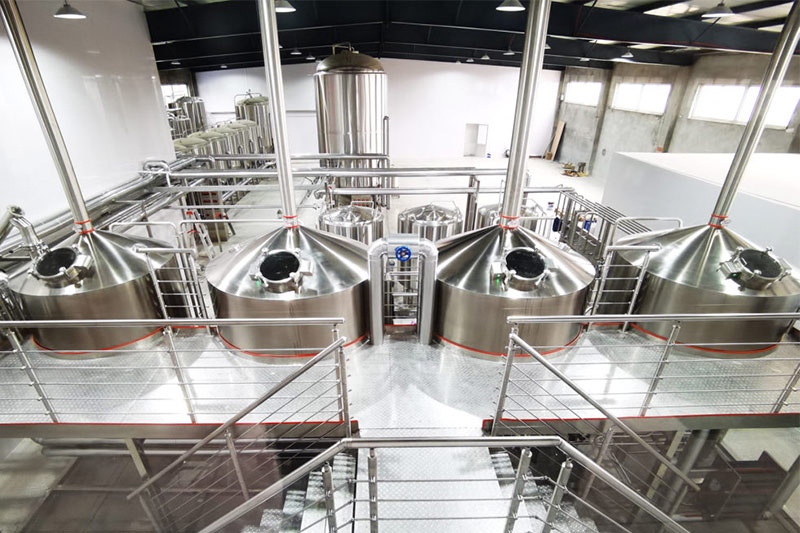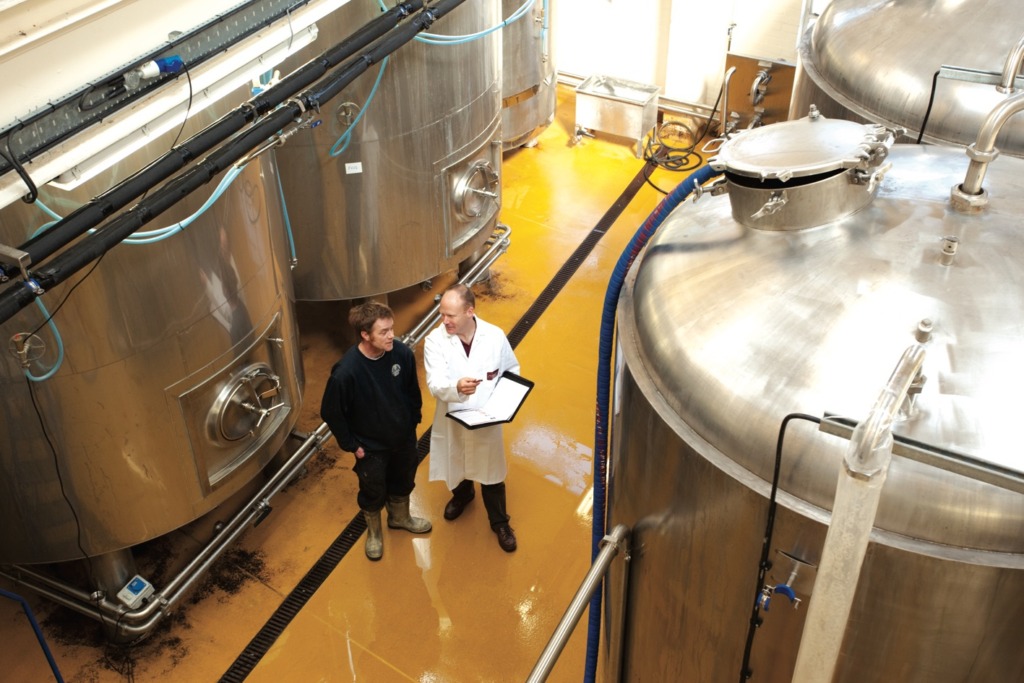In order to produce high-quality beer, you should create an environment that is perfectly clean. Ensure cleanliness of brewery equipment after brewing every time and not just for the sake of it as it appears. By cleaning properly, one prevents contamination which enhances quality production and increases the lifespan of such costly brewing equipment. The goal of this article is to explain why it is important to clean brewery equipment, identify the kind of equipment that need attention, recognize the cleaning agents and tools that should be used as well as outline how to clean in detail step by step. We will also briefly discuss some safety practices during this process and some likely occurring issues with their solutions on how best to go about them.
Key Takeaways
- To avoid contamination and ensure that the beer produced is of high quality, one has to clean brewery equipment regularly.
- Different brewery equipment such as fermenting tanks, brew kettles, and piping need particularized washing procedures.
- The selection of suitable cleaning compounds as well as the right apparatus like chemical detergents, sanitizers and brushes is fundamental to efficient cleaning.
- A systematic procedure of cleaning which involves an initial rinse, the use of detergents or disinfectants and a final rinse or sanitation ensures total cleanliness.
- This is very important when it comes to safety during the process of cleaning and will include among others wearing protective clothing plus gears while doing this activity.

Importance of Cleaning Brewery Equipment
1、Preventing Contamination
Cleaning and sanitizing brewery equipment sufficiently are important in the prevention of contamination. When this is done, these microorganisms on the surface of brewing machines will be brought to a level at which it would no longer affect your fermentation process and final product. Infected equipment can lead to undesirable bacteria as well as yeast that will result in a bad taste or spoiled beer.
2、Ensuring Product Quality
The cleanliness of all batches is preserved so that every brewed beer complies with the necessary standards. Any traces left from earlier brews might change the flavor and fragrance of a new one. This means that breweries produce high quality products which satisfy their customers completely.
3、Extending Equipment Lifespan
Regular cleaning not only ensures beer quality but also increases the longevity of equipment. The build-up and deposits on them cause wear thereby resulting in expensive replacements or repairs. Breweries can keep their machinery running optimally for long periods by ensuring that it is cleaned always.
Types of Brewery Equipment to Clean
1、Fermentation Tanks
Amino acids are in the fermentation processes for beer, and they cleanse tanks from dirt. It consists of two types: natural and non-natural dirt. The side things from grain, yeast wild or any other residue that could mess up with next brew if not well cleaned are organic soils.
2、Boiling Pots
To keep wort uncontaminated while boiled, brewing pots must be deeply cleaned. They may also become crusted from additional components such as hops.
3、Capillary Tubes
These parts usually get forgotten about yet they play an important role which requires regular cleaning. Microbes and residues can live in these parts hence spoil the taste of beer if not sanitized properly. These elements should always remain unpolluted through regular maintenance activities.
Cleaning Agents and Tools
1、Chemical cleaning agents
To keep brewery equipment clean, people always need chemical cleaners as they do remove dirt that is organic and inorganic in nature thus making the equipment uncontaminated. They are designed this way to destroy even dirty materials that remain after brewing.
2、Sanitizer Mixtures
In the final stage of the washing process, sanitizing solutions are important. Sanitizing solutions assist in eradicating any remaining germs, therefore ensuring that the machinery is good for reuse in the next cycle of beer production. Choose a kind of sanitizer which will not spoil your equipment because it matches with its material composition.
3、Cleaning Brushes and Pads
Manual cleaning necessitates use of brushes and pads as essential tools. The range in design means there are different shapes and sizes to suit all machine sections including inaccessible parts. To facilitate easier, faster, more detailed purging process, it is wise to choose suitable brushes or pads during manual cleansing.
Step-by-Step Cleaning Process
Brewery equipment cleaning process has various steps which are vital to maintain its sanitation and upkeep. Initial rinse: Start the procedure by rinsing off any residues visible on the equipment. Use detergents: Thereafter, clean and disinfect all equipment using relevant chemical cleaners or sanitizers. Final rinse and sanitize: Finally, the apparatus should be rinsed again and well disinfected for future purposes.
1、Personal Protective Equipment
It is critical that when cleaning brewery equipment, one must put on the appropriate personal protective equipment (PPE). This encompasses gloves, safety glasses and protective garments that prevent contact of harsh chemicals with skin as well as eyes. Breweries and distilleries often require meticulous cleaning while several tasks need employees to work in confined areas.
2、Cleanliness and Proper Ventilation
By doing this, it will facilitate proper ventilation during the cleaning process. Inhalation is harmful due to some chemical fumes emitted by these detergents. The availability of enough air in a room aids in natural dispersion of these gases thereby maintaining a safe working place.

Common Challenges and Solutions
1、Dealing with Persistent Residues
One of the most intractable problems that arise when cleaning brewery equipment is dealing with persistent residues. They may include soil, dirt and scum as well as fats, proteins, and other sticky substances that can spoil the quality of beer. It is important to use a combination of chemical cleaners and mechanical action.
2、Preventing Equipment Damage
As much as cleaning is important, it is equally important to prevent damage on your equipment. Abrasive tools or harsh chemicals can leave you with scratches and corrosion. Instead go for non-abrasive brushes and pads; also ensure that you follow manufacturer’s instructions on cleaning agents.
3、Ensuring Thorough Sanitization
To prevent contamination and guarantee product quality, proper sanitization must be done. After washing, all equipment should be rigorously rinsed before being sanitized thereafter. Therefore it is very crucial because there could be some remaining microorganisms which would spoil the beer.
Properly washing brewery equipment involves removing dirt, dust, scum, fats, proteins and other sticky materials that would otherwise alter the taste of beer.
conclusion
After use, cleaning brewery equipment is necessary to keep the quality and safety of the produced beer. By following a well-structured cleaning process, breweries can avoid contamination; extend their machinery’s longevity as well as ensure a consistent brewing outcome. Regular maintenance coupled with adherence to cleaning procedures not only safeguards investments made in brewing equipments but also adds to the brewery’s overall success and reputation. Consequently, prioritization of cleanliness and sanitation in every stage of brewing is a very critical aspect that must never be taken for granted.
visit Micet Craft Brewing Equipment.
FAQ
- Why is it mandatory to clean the brewery equipment used?
Cleaning the brewing equipment is important for prevention of contamination, ensuring quality of products and increasing the life of the equipment.
- What are some examples of brewery equipment that need regular cleaning?
Among other essential items, fermentation tanks, brewing kettles and piping and tubing require routine cleaning.
- What are some recommended cleaning agents for brewery equipment?
For effective cleanliness on brewery equipments chemical cleaners, sanitizing solutions, and cleaning brushes and pads are most commonly used.
- Can I use household cleaning products for my brewery equipment?
It is advised against using household cleaning products since they may not work effectively or be safe on a brewer’s equipment. This is why there exist special detergents intended for this purpose.
- What precautions should be observed when carrying out any cleaning task?
These safety measures include wearing protective clothing, observing proper ventilation as well as handling chemical cleaners with caution during washing process.
- How can I remove difficult residues from my brewing instruments?
To help dislodge hard-to-clean residues from your brewing gear you can use the right detergents, employ scrubbing action using brushes or pads. Sometimes it may need to soak the pieces of equipment.

